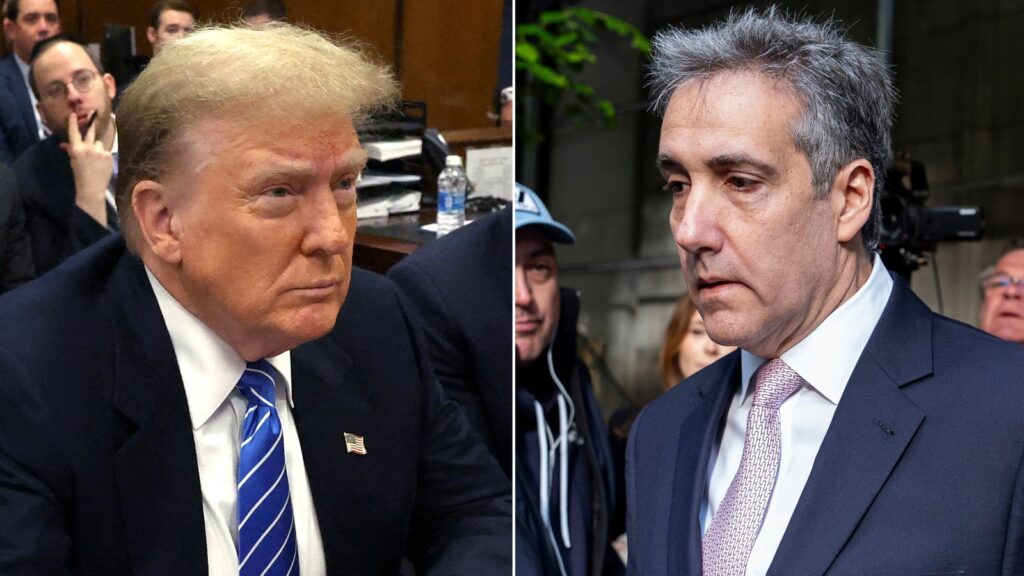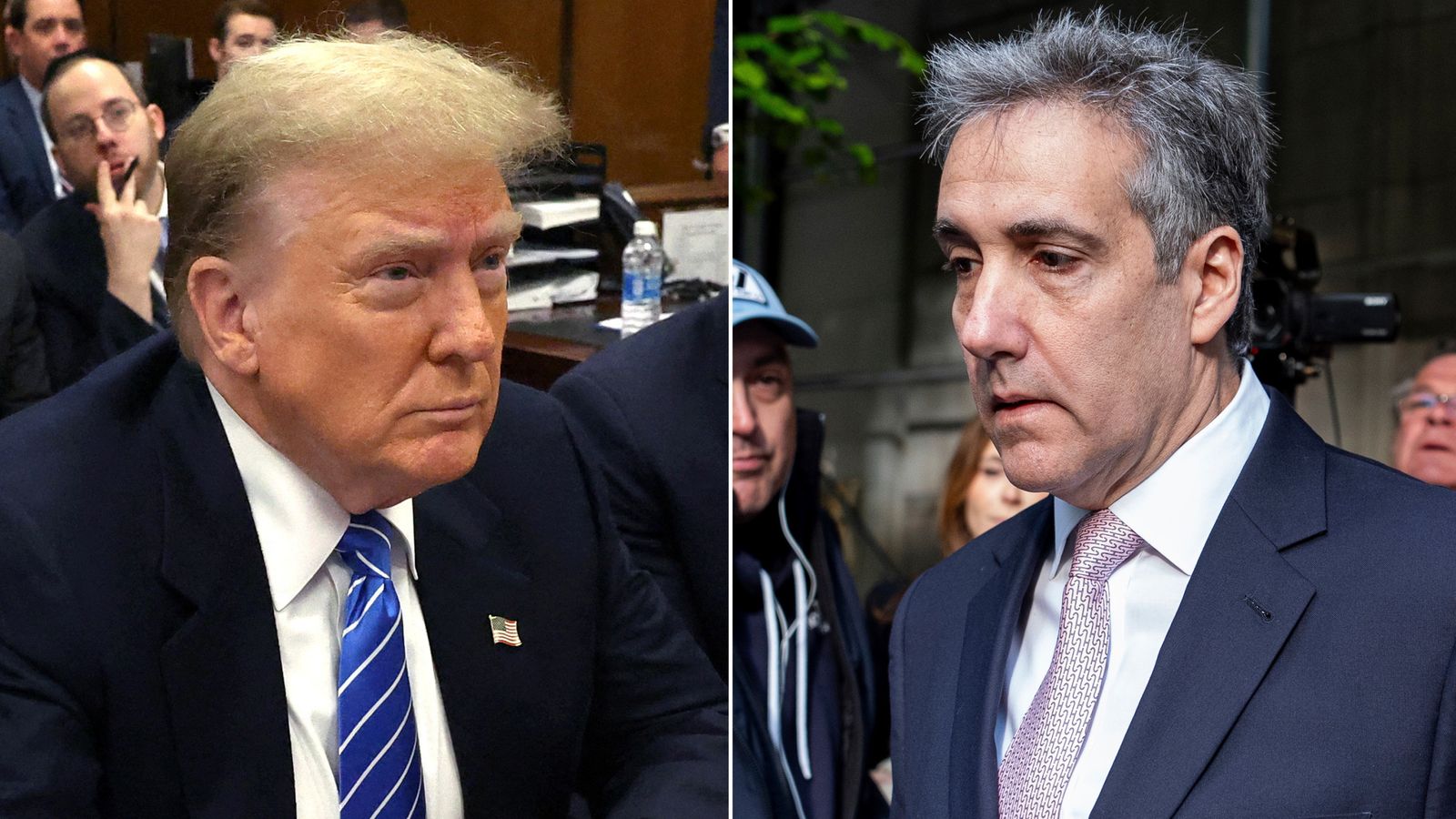Donald Trump and Michael Cohen, Trump trial, Manhattan Criminal Courthouse, Stormy Daniels hush money, Trump lawyer, Trump legal battles, Trump presidency scandal, Cohen testimony, Trump Organization, Trump impeachment, legal drama, political scandal
Explore the tumultuous relationship between Donald Trump and Michael Cohen, from their days of loyalty to their dramatic courtroom battles. This article delves into the intricate details of Cohen’s testimony against Trump, the legal and ethical implications, and the broader impact on American politics. Discover the saga of betrayal, ambition, and retribution that defines their shared history.

On a recent Tuesday afternoon, the Manhattan Criminal Courthouse saw a familiar figure in an all-too-familiar posture. Donald Trump, seated at the defense table, exhibited his characteristic blend of boredom and disdain. His eyes were closed, his suit jacket splayed open, and his arms crossed over his sagging paunch. Some speculated he was sleeping; others believed it was his form of anti-woke defiance. Behind him, in the gallery’s first row, sat his son Eric Trump, intently observing the witness on the stand: Michael Cohen, Trump’s former lawyer and fixer. This scene epitomized the convoluted relationship between Trump and Cohen, a relationship marked by loyalty, betrayal, and mutual destruction.
Cohen’s testimony is central to the Manhattan District Attorney’s case against Trump. This trial, for Cohen, is akin to a personal Super Bowl. In 2018, Cohen pleaded guilty to illegally paying hush money to Stormy Daniels, an adult-film star, to silence her about an alleged affair with Trump in 2006, just before the 2016 presidential election. Cohen served thirteen months in prison and has since sought revenge against his former boss through tell-all books, anti-Trump podcasts, and social media posts celebrating Trump’s legal troubles. As Cohen took the stand, his objective was clear: to expose the dirty laundry of the family he once considered his own.
Trump’s attorney, Todd Blanche, initiated his cross-examination with an attack on Cohen’s credibility. He highlighted Cohen’s propensity for derogatory remarks, referencing a recent TikTok video where Cohen called him a “crying little shit.” Cohen’s unflinching response, “Sounds like something I would say,” set the tone for a contentious exchange. Blanche’s strategy was to paint Cohen as a scoundrel, but the prosecution had already acknowledged Cohen’s checkered past. They presented him as a gangster-like figure despised by many, yet his testimony remained critical because he could directly link Trump to the crimes.
During direct examination, Susan Hoffinger, an Assistant District Attorney, meticulously guided Cohen through the prosecution’s narrative. She questioned him about the scheme to suppress negative stories about Trump before the 2016 election. Cohen confirmed that he paid $130,000 to Daniels on Trump’s behalf and would not have done so if not for the campaign. The prosecution bolstered Cohen’s testimony with corroborating evidence, including checks signed by Trump and notes from Trump Organization’s CFO, Allen Weisselberg, detailing the hush-money reimbursement.
Cohen’s cross-examination by Blanche aimed to dismantle his credibility, but it often veered into petty insults and personal attacks. Blanche’s questions about Cohen’s motivations for fame and publicity did little to shake Cohen’s composure. Even when Blanche highlighted Cohen’s past lies to Congress, Robert Mueller, and the judge who sentenced him, the impact on the jury appeared minimal. Legal analysts critiqued Blanche’s performance, noting that he failed to rattle Cohen or make a significant impression on the jury.
The trial’s significance extends beyond the courtroom, touching on the nature of Trump’s presidency and the lengths his associates went to protect him. Cohen’s testimony about discussions with Trump regarding the payment to Daniels included a critical phone call on October 24, 2016. Blanche attempted to cast doubt on this by highlighting Cohen’s simultaneous issues with prank calls from a teenager, suggesting Cohen’s focus was divided. However, Cohen maintained that he always prioritized informing Trump about crucial matters, including the Daniels payment.
Throughout the trial, Cohen’s demeanor under cross-examination revealed his comfort in the adversarial setting. He acknowledged his past as a bully and liar for Trump, admitting he once relished the role. Despite the legal and personal turmoil, Cohen’s ability to obfuscate and manipulate remained intact. Blanche’s questioning about Cohen’s surreptitious recording of Trump discussing another hush-money payment to Karen McDougal further demonstrated Cohen’s willingness to bend ethical norms when convenient.
Cohen’s evolution from Trump’s loyal fixer to his most vocal critic underscores the complex dynamics within Trumpworld. Despite their falling out, Cohen retained many of the traits he admired in Trump: never backing down, never admitting error, and never showing embarrassment. The trial’s outcome hinges on whether the jury finds Cohen more credible than Trump, despite Cohen’s admitted flaws.
In the broader context, the Trump-Cohen saga exemplifies the intertwined fates of those who rise to power through dubious means. Both men, driven by ambition and willing to engage in unethical behavior, have faced severe consequences. Cohen’s actions on behalf of Trump ultimately led to his imprisonment, while Trump now faces the possibility of a criminal conviction. Their relationship, once symbiotic, has devolved into mutual destruction.
As the trial progresses, the spectacle of Trump and Cohen’s testimonies offers a window into the moral compromises and legal entanglements that defined Trump’s presidency. The jury’s decision will reflect not only on Cohen’s credibility but also on the broader implications of holding powerful figures accountable. Regardless of the outcome, the Trump-Cohen saga serves as a cautionary tale about the perils of loyalty to a flawed leader and the eventual reckoning that follows.
In conclusion, the trial of Donald Trump and Michael Cohen is a dramatic legal battle rooted in years of scandal and deception. Cohen’s role as both witness and antagonist highlights the complex relationship between the two men, marked by loyalty, betrayal, and revenge. As the legal proceedings unfold, the jury’s verdict will determine the fate of both Trump and Cohen, reflecting the broader struggle for justice in a polarized political landscape.
Read More-
